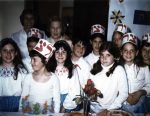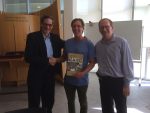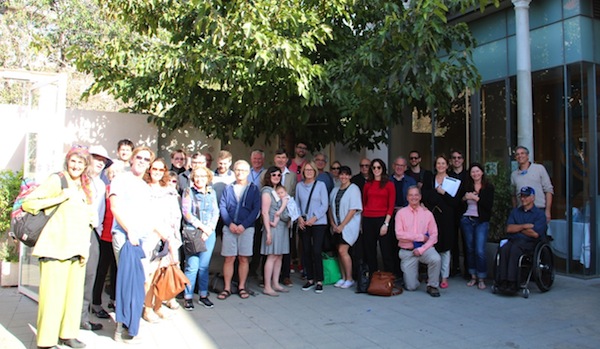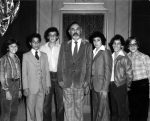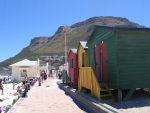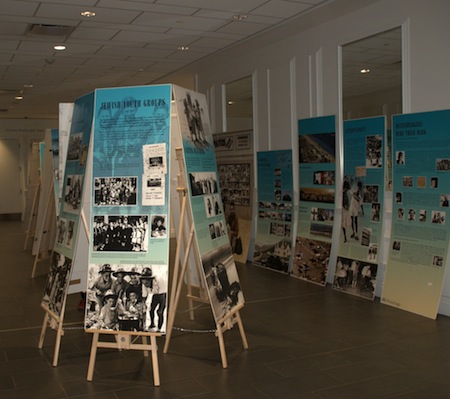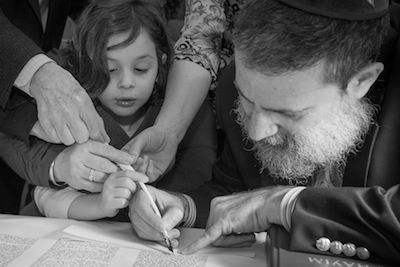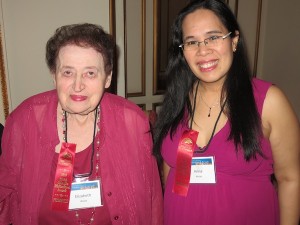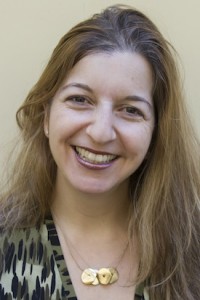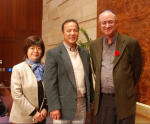Consul General of Japan Seiji Okada, centre, Yasuko Okada and Dr. George Bluman. (photo from Vancouver Holocaust Education Centre)
There are Vancouverites who owe their lives to the wartime actions of the then-obscure Japanese diplomat Chiune Sugihara. The mid-level official, vice-consul in Lithuania for the imperial government of Japan, disobeying explicit and repeated orders, in 1940 issued Japanese transit visas to Jewish refugees fleeing the advancing Nazi onslaught.
Two of the people who received the visas were Nathan and Susan Bluman. Their son, Dr. George Bluman, delivered the keynote address Sunday at the 33rd annual Kristallnacht commemoration event, presented by the Vancouver Holocaust Education Centre in partnership with Congregation Beth Israel.
Bluman recounted the story of Sugihara’s life and the motivations for his actions, then addressed the magnitude of those events on his own family.
“There are thousands of stories like my parents’,” said Bluman, noting that this one family’s story is barely a footnote in the Sugihara narrative, but it means “the entire world for me and my family.”
Bluman, professor emeritus of mathematics at the University of British Columbia, said his parents were two of about 2,100 people who received life-giving visas from the Japanese consular official. Approximately another 600 individuals were aided by being included in the visas of others, mostly their parents, and perhaps 25% more were helped in their survival by forged versions of Sugihara visas.
Bluman explained that, after Germany invaded Poland and divvied the country up with the Soviet Union, many Jews fled to the Soviet-occupied portion. Unable to flee to the west, and having been denied entry by most Western countries, Jews were effectively trapped.
Nathan Bluman and his fiancée Susan lived in Warsaw, which was occupied by the Nazis. Nathan fled to the Soviet-occupied east and prevailed upon Susan to join him, which she did, though her father forbade them from marrying without his permission.
“She would never again see any of her parents or siblings,” Bluman said.
While Germany had occupied the Netherlands, Dutch embassies and consulates worldwide remained loyal to the Dutch government-in-exile, located in London. Jan Zwartendijk, the Dutch consul in Lithuania, began issuing visas to Curaçao, the Dutch colony in the Caribbean. Jewish refugees, including many Polish Jews like Nathan and Susan Bluman, made their way to Lithuania in hopes of obtaining a ticket to safety.
When the Soviet Union occupied Lithuania in 1940, all foreign embassies and consulates were ordered closed. In the short window available, the Dutch consul, with the support of his superiors in the government-in-exile, issued visas for Jewish refugees to enter Curaçao.
However, while Polish and Lithuanian Jewish refugees were free to travel in the Soviet Union, they could not go further without a visa to another country. That made a Japanese transit visa priceless.
While there is no evidence that Zwartendijk and Sugihara ever met, it was their combined actions that are credited with saving thousands of lives. While Zwartendijk acted with the authority of his superiors, Sugihara ignored explicit orders not to issue transit visas, an act of extraordinary disobedience for a mid-level Japanese bureaucrat and an action that not only put his job on the line, but threatened the lives of himself and his family.
Sugihara handwrote the visas day and night, issuing the equivalent of an average month’s worth of visas every day in the weeks before the consulate was forcibly closed by the Soviets.
The combination of a Dutch visa to Curaçao and a transit visa for Japan allowed refugees to make the arduous journey on the Trans-Siberian Railway to Vladivostok, board a ship to a Japanese port, take a train to Kobe and, in various ways, survive the war. In many cases, the refugees became stateless people, interned first in Japan and then in Japanese-occupied Shanghai.
Bluman’s parents managed to get on one of the last two ships heading to North America before the Japanese attack on Pearl Harbor launched Japan and the United States into a state of war and made passage impossible.
The Bluman family’s fate was influenced by one of those fortunate flukes that occurs in history. While in Japan, Nathan Bluman ran into an old professor from school in Warsaw, who told him that a ship, the Hei Maru, was to leave for Vancouver the next day. Bluman raced to the Canadian consulate to request one of the 25 visas being offered to skilled workers and it was granted. There were no provisions for spouses but Susan Bluman, using some sort of extraordinary persuasive power, managed to get the Canadian official to include her on her husband’s visa and they boarded the ship the same day, arriving in Vancouver on July 9, 1941.
That single transit visa was responsible for 17 lives, including Nathan and Susan Bluman, their children and grandchildren and three great-grandchildren born this year.
George Bluman estimates that, in all, 30,000 people worldwide owe their lives to Sugihara. Yet, it was not until 1968, when a survivor contacted him, that Sugihara began to understand the magnitude of what he had done during the war. In 1985, he was named by Yad Vashem as one of the Righteous Among the Nations.
Sugihara died in 1986, as did Nathan Bluman. But the Bluman and Sugihara families have had a long association and friendship that remains strong today to the third generation.
The event Sunday night at Beth Israel began with a solemn candlelight procession of local survivors of the Holocaust.
The annual event commemorates Kristallnacht, the “Night of Broken Glass,” a government-initiated pogrom across Germany and Austria on the night of Nov. 9-10, 1938. Hundreds of synagogues were burned, Jewish-owned businesses were destroyed, nearly 100 Jews were killed and 30,000 were sent to concentration camps.
Prof. Chris Friedrichs, a member of the commemoration’s organizing committee, noted that the Holocaust ended 70 years ago with the Allied defeat of the Nazi regime. But when did it begin? Kristallnacht is often cited as the moment when the increasingly repressive policies of the Hitler dictatorship turned into the violence that would culminate in the “Final Solution.”
But Friedrichs said that the Holocaust was not so much a direct result of events of that fateful night.
“It is what did not happen in the days that followed,” he said. After a day or two of headlines worldwide, said Friedrichs, there was nothing more. The world’s reaction, or lack of it, was the signal the Nazis needed to be assured that their policies of eliminating those “deemed unworthy of life” would meet with no resistance from the world community.
Referring to the procession of candle-bearing survivors that had just preceded him, Friedrichs said, “a candle may not seem very heavy to you.” But each of the survivors who mounted the bimah, said Friedrichs, belonged to a family, many of whom were almost completely destroyed, and the candles represent not just their families or hundreds or thousands of people, but millions.
Vancouver City Councillor
Andrea Reimer, deputy mayor of the city, broke down in tears while reading the mayor’s proclamation after telling the audience how the history of the Holocaust tests for faith in humanity.
Beth Israel’s Rabbi Jonathan Infeld thanked Bluman and expressed gratitude that Bluman is a member of his congregation.
“You are a key component of maintaining the history of the Holocaust in our community,” Infeld said.
Arthur Guttman, cantor emeritus of Temple Sholom, chanted El Moleh Rachamim, the memorial prayer for the martyrs. Ed Lewin, president of the Vancouver Holocaust Education Centre, introduced the survivors. Gary Miller, president of Beth Israel, introduced Reimer. Bluman was introduced by Prof. Richard Menkis, a member of the Kristallnacht commemoration organizing committee.

